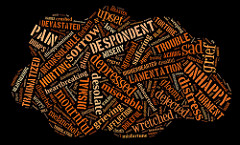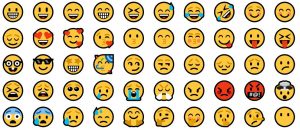We cannot escape our daily stress as much as we want to eliminate the tension and pressure of life. In this month’s blog on stress awareness, I want to highlight the different aspects of stress, healthy vs unhealthy, stress types, including stress symptoms.
In everyday conversation, the word stress can conjure many different meanings to the speaker and the listener because of our subjective experiences. I might say that I’m stressed when I am under pressure at work or when other people put a strain on me.
 A stressful situation for one person will inevitably be different. People are divergent and will have a different way to view or manage problems. From our lived experiences, these individuals can often draw upon their internal resources to cope with stress. However, it does not mean that you can’t learn to build your inner strength.
A stressful situation for one person will inevitably be different. People are divergent and will have a different way to view or manage problems. From our lived experiences, these individuals can often draw upon their internal resources to cope with stress. However, it does not mean that you can’t learn to build your inner strength.
“Stress is a mental state; both emotional and physical arise due to tension, pressure or strain from an adverse or demanding person or situation.”
Stress is a mental state; both emotional and physical arise due to tension, pressure, or strain from an adverse or demanding person or situation. It is a drama in the psyche and manifested as a reaction, co-created into a reality. Any thoughts, conditions or circumstances can create stress in any person. I find that it is helpful first to check whether stress is healthy or unhealthy.
Healthy stress occurs in situations when your reaction is in proportion to the circumstance. For example, the day before an important job interview, you might be stressed because of additional urgent work requests from your line manager. The added pressure of the extra workload on top of nervousness for tomorrow’s interview is healthy stress when you can manage both challenges.
Unhealthy stress occurs when your reaction is out of proportion to the circumstance—sticking to the same scenario above. When stress overwhelmed the person, it becomes unhealthy. If this person becomes panicky and angry at the urgency of the request, combined with automatic negative thoughts of the must or should, and voila. The individual may make mistakes, creating unnecessary time constrain to the additional workload. The problem can quickly escalate and inundate the person’s feeling, emotions and reactions, magnifying the situation.
 How we think and react can create or break the situation into a stressful or stress-free one. There are three main types of stress; acute, episodic and chronic. I shall now review the different kinds of stress in more details.
How we think and react can create or break the situation into a stressful or stress-free one. There are three main types of stress; acute, episodic and chronic. I shall now review the different kinds of stress in more details.
Acute stress is any situation that develops quickly but does not usually last longer than a month or so. The event is often severe due to an unexpected crisis or trauma, such as loss of a relationship, job or identity. If the symptoms persist longer, it could lead to a disorder, such as post-traumatic stress disorder. In which case, please, seek medical assistance from a qualified physician.
Episodic stress is any situation that frequently occurred, expected or unexpected. It often arises from recurring conditions that caused repeated stressful reaction. There may be a pattern to episodic stress, such as in the workplace, household, or specific person.
Chronic stress is any situation that causes prolonged emotional and psychological disturbances. In this situation, the stress may initially begin as acute stress, which became a problem over a long period of time, sometimes many years.
As you become aware of your stress level, you also need to know your stressful sources, whether internal or external. Any form of stress that lasts more than a week can become a problem if it is not processed. Processing begins internally within ourselves. We have to look within for the source of our emotional and psychological reaction to the situation. If you can start to take responsibilities for your stress and acknowledge the feelings, emotions, behaviours and reactions, you are on the road to change.
“Processing begins internally within ourselves.”
Unfortunately, we are the culprit for much of our stress as we can also put pressure on ourselves. A perfectionist may put pressure on herself to do a good job. Add a ‘must’, ‘should’ or ‘ought to’, ‘got to’ to the inner voice or belief, and you have the individual thinking, ‘I must do a good job’ or ‘I got to be good at my job’.
Sometimes knowing symptoms of any distress within yourself can be helpful, as you can check whether your reaction is in proportion or disproportion to the circumstance.
Some of the physiological symptoms of stress include:
- Aches, pains and tense body or muscles.
- Upset or knotted stomach, IBS, diarrhoea, constipation, sickness, nausea.
- Low energy, tiredness, fatigue, sleeplessness.
- Chest pain, rapid heartbeat, hotness, sweating, redness, feeling flush.
- Headaches, earaches, dry mouth, clenched or grinding teeth, including a locked jaw.
Some of the emotional symptoms of stress include:
- avoidance, avoiding others, avoiding confrontation.
- Depression, low moods, or moodiness.
- Anxiety, feeling overwhelmed, or feeling panicked.
- Irritability, anger, frustration, anger and aggressive outbursts.
- Loneliness, isolation, feeling like a failure, feeling useless.
Some of the cognitive symptoms of stress include:
- Problem focusing, concentrating or thinking.
- Poor judgement, or make an incorrect decision due to panicking.
- Worrying, obsessing or compulsivity.
- Constantly ruminating about the negatives.
- Have doubts about one’s ability, knowledge and skills.
- Unable to make a decision, unsure and uncertain about making decisions.
- Thinking about old stresses and past events.
Some of the behavioural symptoms of stress include:
- Nervousness, twitching, nail-biting, teeth grinding, pacing etc.
- Being jumpy, shaky or freezes in reaction to situation, person or circumstance.
- Prone to violence, hostility, disruptive or defiance behaviour, including sabotage.
- Increase or decrease food consumption.
- Increase consumption of alcohol, smoking or drug use.
- Increase compulsivity for exercise, gambling, or other maladaptive behaviours.
- Self-harming.
The thing to note is that you can learn to manage your stress. Everyone can learn how to cope with their emotional, physical stress. We are all capable of re-educating ourselves. Learning to discover something new out ourselves is a joy. I had found that you can make learning fun, exciting, explorative and curious. Suppose you can hold this concept when you learn about yourself in a stressful situation. In that case, you will become appreciative and compassionate about yourself and the stresses around you because you are not your stress. Here are a few pointers:
- Know your triggers
 Knowing your trigger will help you notice your stress pattern. Knowing this fact may be helpful to master your internal emotional reaction in a stressful situation. Knowing is an acknowledgement or awareness of what was previously elusive to you. It is about being conscious of what was unconscious about you.
Knowing your trigger will help you notice your stress pattern. Knowing this fact may be helpful to master your internal emotional reaction in a stressful situation. Knowing is an acknowledgement or awareness of what was previously elusive to you. It is about being conscious of what was unconscious about you.
One of my triggers used to be that I was highly anxious about travelling to someplace new without knowing where to park. The stress of finding a parking space was thought-provoking. I was worried about not finding a spot to park safely. I was maximising the problem by creating a traffic jam within my mind. I was anxious about being late as a result of not finding a safe spot for the car.
- Know your reactions
 Know your reaction will help you notice how you were in the situation. Knowing this fact may help you see, feel, or think about your response and healthy or unhealthy. Knowing that will help you sense how you are within yourself and how you responded to the situation, including those around you. Knowing this will help you decide whether or not you might need to change and try reacting differently.
Know your reaction will help you notice how you were in the situation. Knowing this fact may help you see, feel, or think about your response and healthy or unhealthy. Knowing that will help you sense how you are within yourself and how you responded to the situation, including those around you. Knowing this will help you decide whether or not you might need to change and try reacting differently.
In the stressful situation above, I would create a dramatised, visualised scenes. My mind could create a drama. I imagined driving around, looking for the perfect spot for the car. I would imagine an accident or road work creating a delay in my travel. I could feel myself walking in the meeting late, being hot and bothered.
- Know your thoughts
 Knowing what you think about will help you make sense of your inner voice. Listening to what you say and how you talk to yourself in a stressful situation will help you become in control of the situation, rather than allowing the problem to control you. We are often overly critical of ourselves. We can be the harshest critique. But, if we can be compassionate and kinder to ourselves, we can be free of the thoughts and let them go easier.
Knowing what you think about will help you make sense of your inner voice. Listening to what you say and how you talk to yourself in a stressful situation will help you become in control of the situation, rather than allowing the problem to control you. We are often overly critical of ourselves. We can be the harshest critique. But, if we can be compassionate and kinder to ourselves, we can be free of the thoughts and let them go easier.
In my mind, in the above situation, I was critical. I used to say that I was a drama queen! I used to say that I was attention-seeking as I ran into class late. I used to think that I was unorganised, chaotic and unable to prioritise. I used to believe that I would be ‘told off’ if I was ever late for appointments.
- Learn to speak to yourself differently
 Now, try learning to speak to yourself differently. If you used to shout at yourself internally, why not try speaking softly this time. Hopefully, you will notice that the impact is dramatically reduced. You may start to notice an alternate feeling associated with the gentle inner voice. You also may hear yourself speaking using contrasting words, kinder and loving expression. The change begins with small and enlarges, like a ripple.
Now, try learning to speak to yourself differently. If you used to shout at yourself internally, why not try speaking softly this time. Hopefully, you will notice that the impact is dramatically reduced. You may start to notice an alternate feeling associated with the gentle inner voice. You also may hear yourself speaking using contrasting words, kinder and loving expression. The change begins with small and enlarges, like a ripple.
I noticed my inner critique, and I named her. The inner voice was familiar. I recognised her from before. She was an archetype of someone in the long distant past. Naming her helped me to notice her, and thus I became aware of how she had created the inner stress, which manifested in situations in my external world. She had been the causes of my tensions. When I noticed that, I noted that I had choices. I chose to change her tone, and I chose to look at her different until I see her in a different light.
Having an awareness of your stress can be helpful in most situation or circumstance, but it is also a great way to learn something new about yourself.
After all, learning something new about the self is especially exciting to psychological growth and spiritual development.
“Stress begins like a ripple. It starts of small but can quickly turn into somthing larger and bigger.”
Do you find this blog helpful? If you like this post, I love to hear from you on my Twitter Page.

